CMM91010: Reflection Essay on Professional Identity, SCU
VerifiedAdded on 2023/04/17
|8
|1872
|83
Essay
AI Summary
This reflection essay explores the development of a healthcare professional's identity, deeply rooted in early experiences and shaped by values of fairness, equality, and cultural sensitivity. The essay emphasizes the importance of unbiased and nonjudgmental care for mentally ill patients, highlighting the significance of collaborative practices within multi-disciplinary teams and building therapeutic relationships with patients. The author reflects on personal theories and beliefs, including the influence of parents, mentors, and the principles of dignity, respect, and accountability, which have shaped their approach to patient care. The essay concludes with a professional philosophy emphasizing ethical practices, collaboration, patient participation, and continuous professional development to provide high-quality care. The essay references the assignment brief for the Master of Healthcare Leadership program and the CMM91010 unit at Southern Cross University.
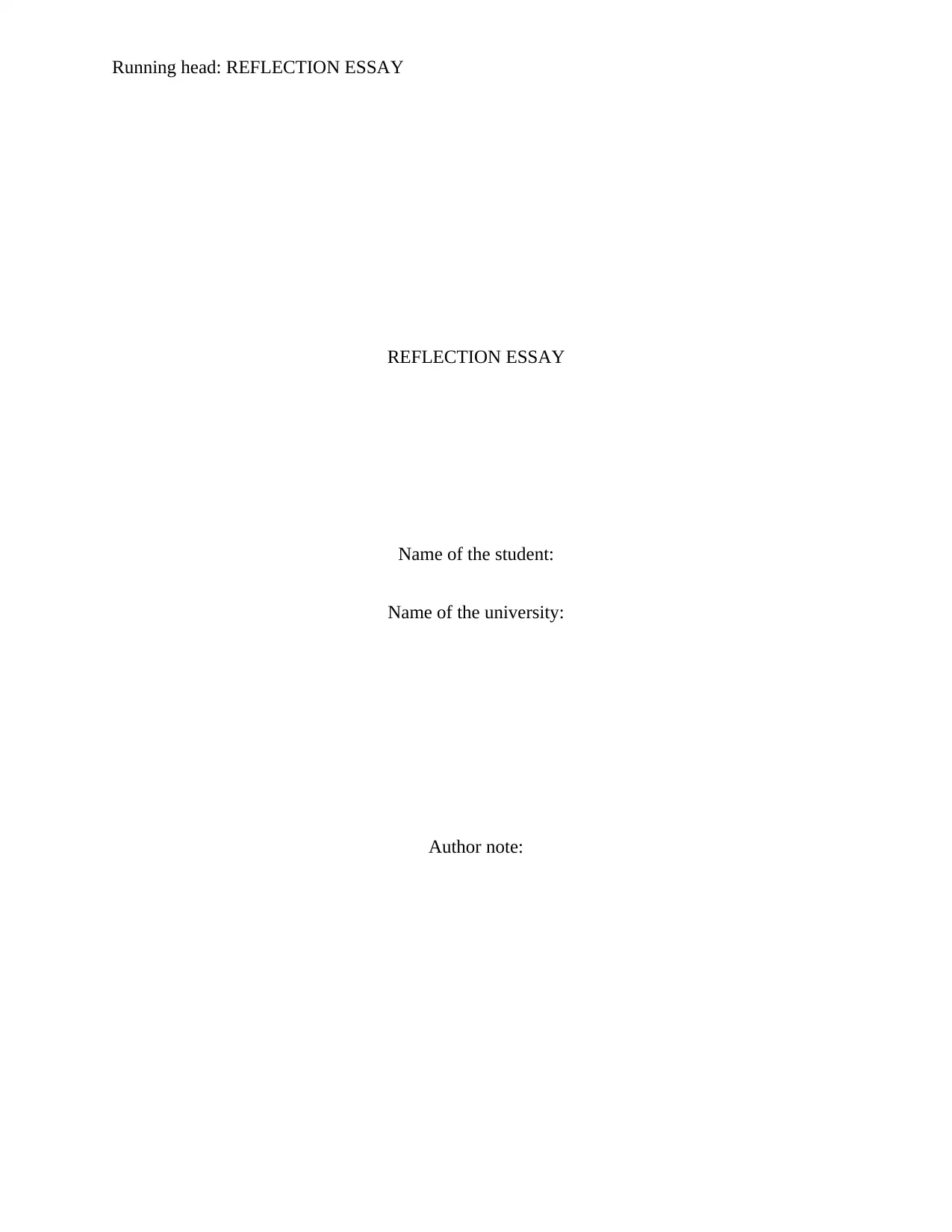
Running head: REFLECTION ESSAY
REFLECTION ESSAY
Name of the student:
Name of the university:
Author note:
REFLECTION ESSAY
Name of the student:
Name of the university:
Author note:
Paraphrase This Document
Need a fresh take? Get an instant paraphrase of this document with our AI Paraphraser
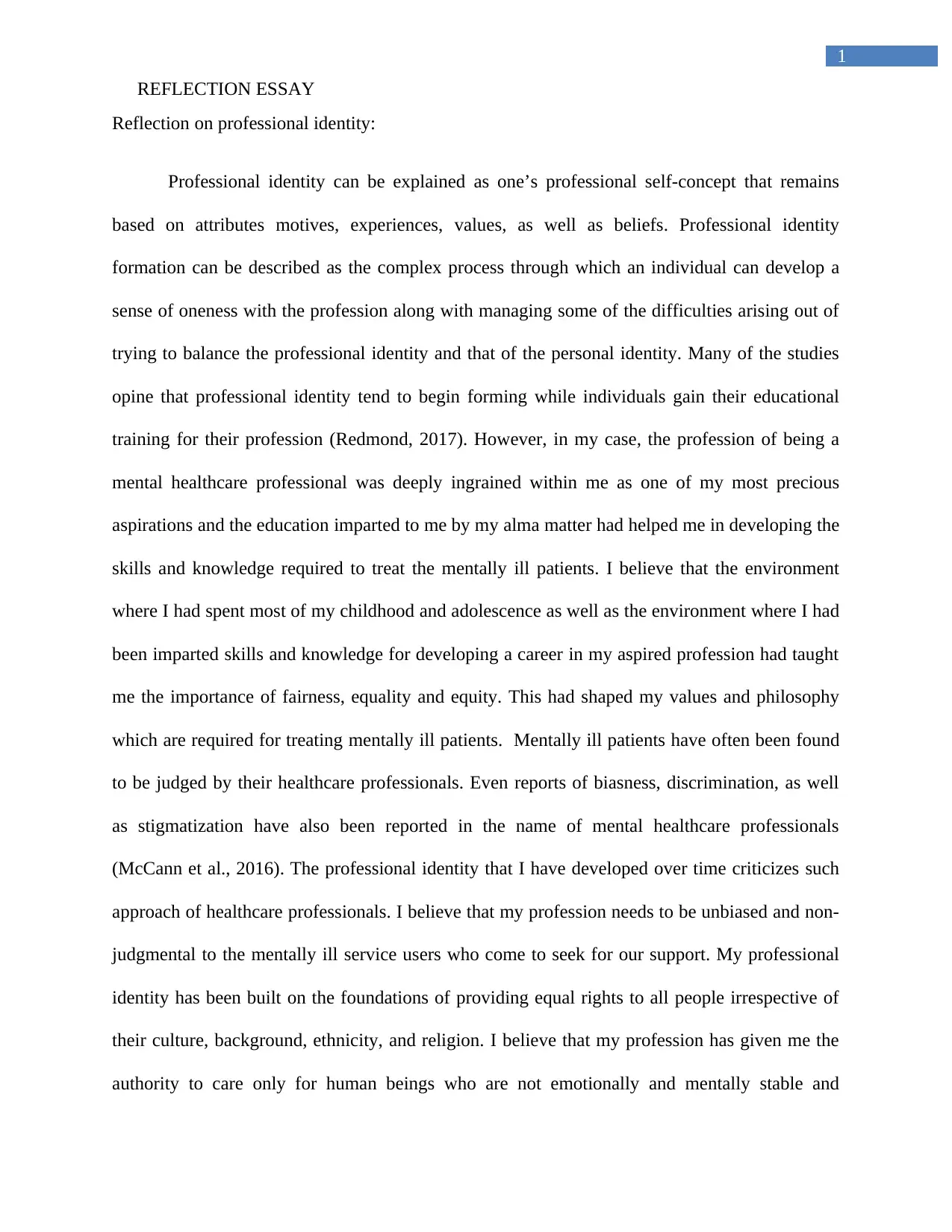
1
REFLECTION ESSAY
Reflection on professional identity:
Professional identity can be explained as one’s professional self-concept that remains
based on attributes motives, experiences, values, as well as beliefs. Professional identity
formation can be described as the complex process through which an individual can develop a
sense of oneness with the profession along with managing some of the difficulties arising out of
trying to balance the professional identity and that of the personal identity. Many of the studies
opine that professional identity tend to begin forming while individuals gain their educational
training for their profession (Redmond, 2017). However, in my case, the profession of being a
mental healthcare professional was deeply ingrained within me as one of my most precious
aspirations and the education imparted to me by my alma matter had helped me in developing the
skills and knowledge required to treat the mentally ill patients. I believe that the environment
where I had spent most of my childhood and adolescence as well as the environment where I had
been imparted skills and knowledge for developing a career in my aspired profession had taught
me the importance of fairness, equality and equity. This had shaped my values and philosophy
which are required for treating mentally ill patients. Mentally ill patients have often been found
to be judged by their healthcare professionals. Even reports of biasness, discrimination, as well
as stigmatization have also been reported in the name of mental healthcare professionals
(McCann et al., 2016). The professional identity that I have developed over time criticizes such
approach of healthcare professionals. I believe that my profession needs to be unbiased and non-
judgmental to the mentally ill service users who come to seek for our support. My professional
identity has been built on the foundations of providing equal rights to all people irrespective of
their culture, background, ethnicity, and religion. I believe that my profession has given me the
authority to care only for human beings who are not emotionally and mentally stable and
REFLECTION ESSAY
Reflection on professional identity:
Professional identity can be explained as one’s professional self-concept that remains
based on attributes motives, experiences, values, as well as beliefs. Professional identity
formation can be described as the complex process through which an individual can develop a
sense of oneness with the profession along with managing some of the difficulties arising out of
trying to balance the professional identity and that of the personal identity. Many of the studies
opine that professional identity tend to begin forming while individuals gain their educational
training for their profession (Redmond, 2017). However, in my case, the profession of being a
mental healthcare professional was deeply ingrained within me as one of my most precious
aspirations and the education imparted to me by my alma matter had helped me in developing the
skills and knowledge required to treat the mentally ill patients. I believe that the environment
where I had spent most of my childhood and adolescence as well as the environment where I had
been imparted skills and knowledge for developing a career in my aspired profession had taught
me the importance of fairness, equality and equity. This had shaped my values and philosophy
which are required for treating mentally ill patients. Mentally ill patients have often been found
to be judged by their healthcare professionals. Even reports of biasness, discrimination, as well
as stigmatization have also been reported in the name of mental healthcare professionals
(McCann et al., 2016). The professional identity that I have developed over time criticizes such
approach of healthcare professionals. I believe that my profession needs to be unbiased and non-
judgmental to the mentally ill service users who come to seek for our support. My professional
identity has been built on the foundations of providing equal rights to all people irrespective of
their culture, background, ethnicity, and religion. I believe that my profession has given me the
authority to care only for human beings who are not emotionally and mentally stable and
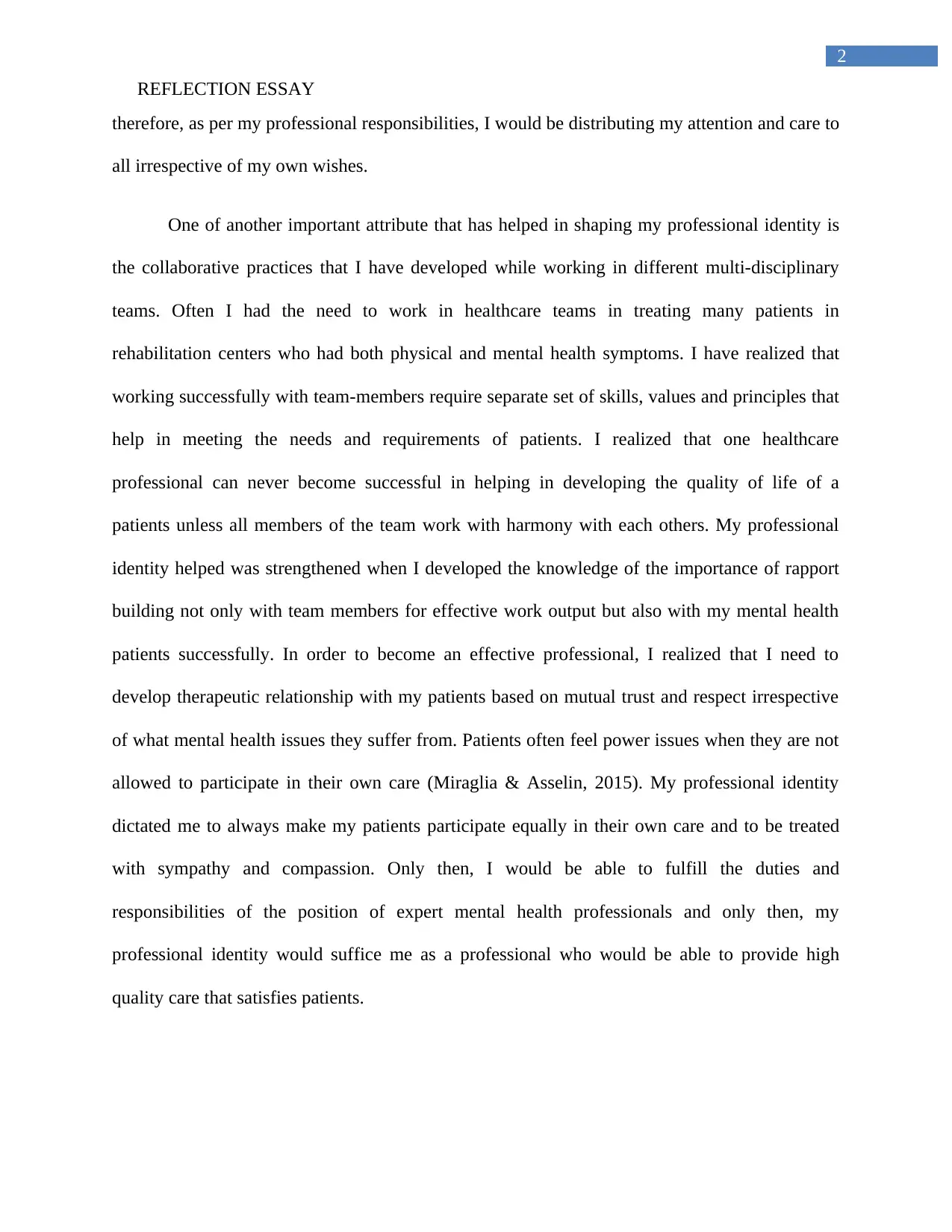
2
REFLECTION ESSAY
therefore, as per my professional responsibilities, I would be distributing my attention and care to
all irrespective of my own wishes.
One of another important attribute that has helped in shaping my professional identity is
the collaborative practices that I have developed while working in different multi-disciplinary
teams. Often I had the need to work in healthcare teams in treating many patients in
rehabilitation centers who had both physical and mental health symptoms. I have realized that
working successfully with team-members require separate set of skills, values and principles that
help in meeting the needs and requirements of patients. I realized that one healthcare
professional can never become successful in helping in developing the quality of life of a
patients unless all members of the team work with harmony with each others. My professional
identity helped was strengthened when I developed the knowledge of the importance of rapport
building not only with team members for effective work output but also with my mental health
patients successfully. In order to become an effective professional, I realized that I need to
develop therapeutic relationship with my patients based on mutual trust and respect irrespective
of what mental health issues they suffer from. Patients often feel power issues when they are not
allowed to participate in their own care (Miraglia & Asselin, 2015). My professional identity
dictated me to always make my patients participate equally in their own care and to be treated
with sympathy and compassion. Only then, I would be able to fulfill the duties and
responsibilities of the position of expert mental health professionals and only then, my
professional identity would suffice me as a professional who would be able to provide high
quality care that satisfies patients.
REFLECTION ESSAY
therefore, as per my professional responsibilities, I would be distributing my attention and care to
all irrespective of my own wishes.
One of another important attribute that has helped in shaping my professional identity is
the collaborative practices that I have developed while working in different multi-disciplinary
teams. Often I had the need to work in healthcare teams in treating many patients in
rehabilitation centers who had both physical and mental health symptoms. I have realized that
working successfully with team-members require separate set of skills, values and principles that
help in meeting the needs and requirements of patients. I realized that one healthcare
professional can never become successful in helping in developing the quality of life of a
patients unless all members of the team work with harmony with each others. My professional
identity helped was strengthened when I developed the knowledge of the importance of rapport
building not only with team members for effective work output but also with my mental health
patients successfully. In order to become an effective professional, I realized that I need to
develop therapeutic relationship with my patients based on mutual trust and respect irrespective
of what mental health issues they suffer from. Patients often feel power issues when they are not
allowed to participate in their own care (Miraglia & Asselin, 2015). My professional identity
dictated me to always make my patients participate equally in their own care and to be treated
with sympathy and compassion. Only then, I would be able to fulfill the duties and
responsibilities of the position of expert mental health professionals and only then, my
professional identity would suffice me as a professional who would be able to provide high
quality care that satisfies patients.
⊘ This is a preview!⊘
Do you want full access?
Subscribe today to unlock all pages.

Trusted by 1+ million students worldwide
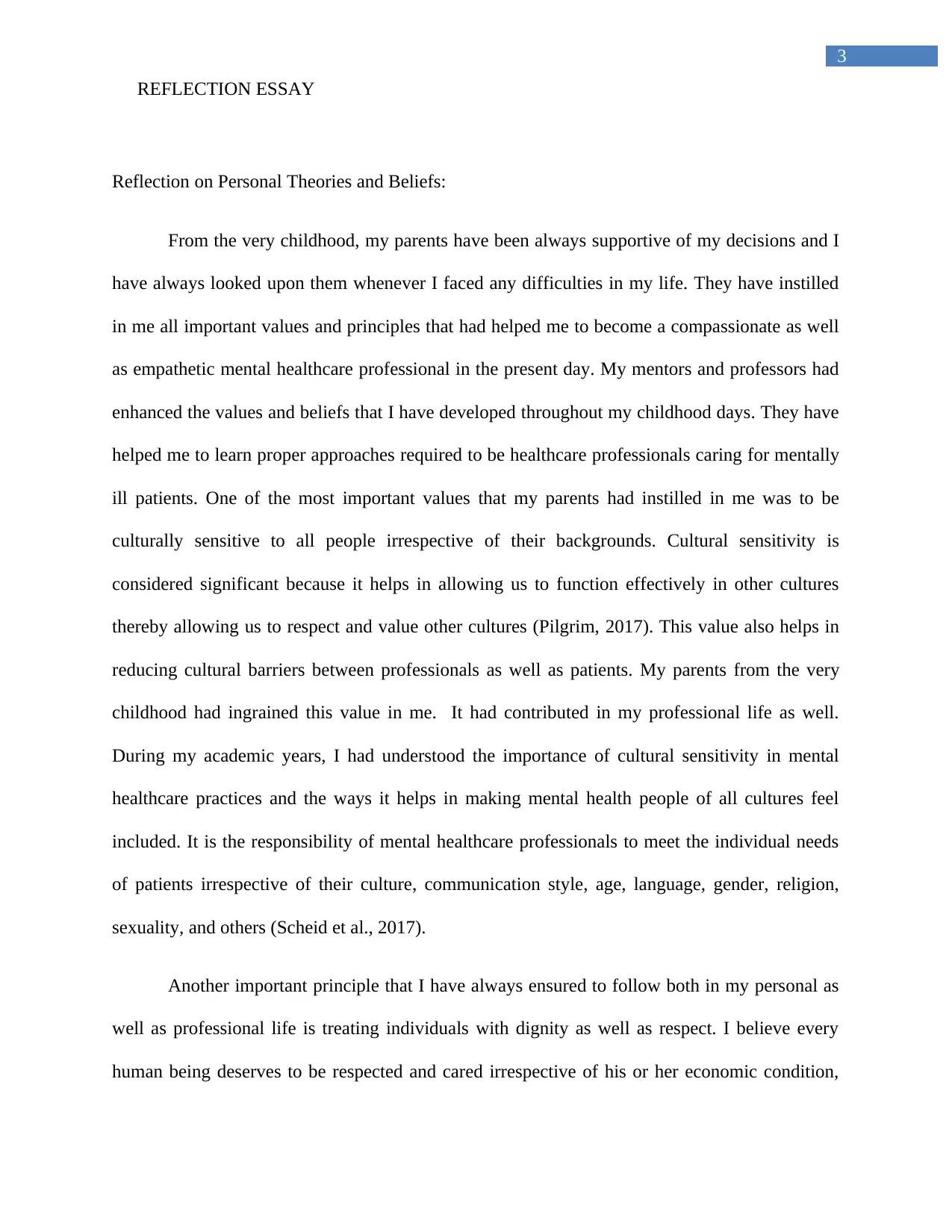
3
REFLECTION ESSAY
Reflection on Personal Theories and Beliefs:
From the very childhood, my parents have been always supportive of my decisions and I
have always looked upon them whenever I faced any difficulties in my life. They have instilled
in me all important values and principles that had helped me to become a compassionate as well
as empathetic mental healthcare professional in the present day. My mentors and professors had
enhanced the values and beliefs that I have developed throughout my childhood days. They have
helped me to learn proper approaches required to be healthcare professionals caring for mentally
ill patients. One of the most important values that my parents had instilled in me was to be
culturally sensitive to all people irrespective of their backgrounds. Cultural sensitivity is
considered significant because it helps in allowing us to function effectively in other cultures
thereby allowing us to respect and value other cultures (Pilgrim, 2017). This value also helps in
reducing cultural barriers between professionals as well as patients. My parents from the very
childhood had ingrained this value in me. It had contributed in my professional life as well.
During my academic years, I had understood the importance of cultural sensitivity in mental
healthcare practices and the ways it helps in making mental health people of all cultures feel
included. It is the responsibility of mental healthcare professionals to meet the individual needs
of patients irrespective of their culture, communication style, age, language, gender, religion,
sexuality, and others (Scheid et al., 2017).
Another important principle that I have always ensured to follow both in my personal as
well as professional life is treating individuals with dignity as well as respect. I believe every
human being deserves to be respected and cared irrespective of his or her economic condition,
REFLECTION ESSAY
Reflection on Personal Theories and Beliefs:
From the very childhood, my parents have been always supportive of my decisions and I
have always looked upon them whenever I faced any difficulties in my life. They have instilled
in me all important values and principles that had helped me to become a compassionate as well
as empathetic mental healthcare professional in the present day. My mentors and professors had
enhanced the values and beliefs that I have developed throughout my childhood days. They have
helped me to learn proper approaches required to be healthcare professionals caring for mentally
ill patients. One of the most important values that my parents had instilled in me was to be
culturally sensitive to all people irrespective of their backgrounds. Cultural sensitivity is
considered significant because it helps in allowing us to function effectively in other cultures
thereby allowing us to respect and value other cultures (Pilgrim, 2017). This value also helps in
reducing cultural barriers between professionals as well as patients. My parents from the very
childhood had ingrained this value in me. It had contributed in my professional life as well.
During my academic years, I had understood the importance of cultural sensitivity in mental
healthcare practices and the ways it helps in making mental health people of all cultures feel
included. It is the responsibility of mental healthcare professionals to meet the individual needs
of patients irrespective of their culture, communication style, age, language, gender, religion,
sexuality, and others (Scheid et al., 2017).
Another important principle that I have always ensured to follow both in my personal as
well as professional life is treating individuals with dignity as well as respect. I believe every
human being deserves to be respected and cared irrespective of his or her economic condition,
Paraphrase This Document
Need a fresh take? Get an instant paraphrase of this document with our AI Paraphraser
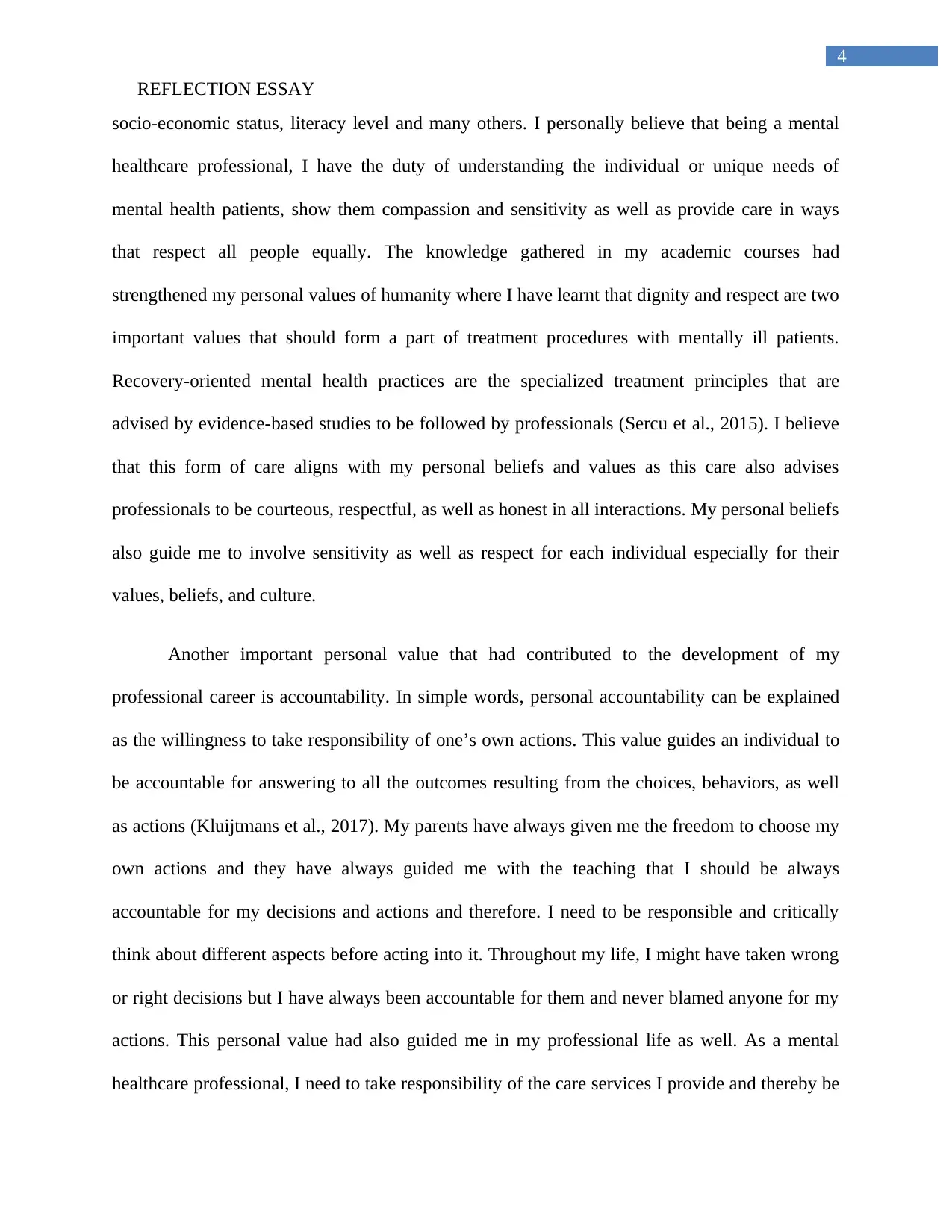
4
REFLECTION ESSAY
socio-economic status, literacy level and many others. I personally believe that being a mental
healthcare professional, I have the duty of understanding the individual or unique needs of
mental health patients, show them compassion and sensitivity as well as provide care in ways
that respect all people equally. The knowledge gathered in my academic courses had
strengthened my personal values of humanity where I have learnt that dignity and respect are two
important values that should form a part of treatment procedures with mentally ill patients.
Recovery-oriented mental health practices are the specialized treatment principles that are
advised by evidence-based studies to be followed by professionals (Sercu et al., 2015). I believe
that this form of care aligns with my personal beliefs and values as this care also advises
professionals to be courteous, respectful, as well as honest in all interactions. My personal beliefs
also guide me to involve sensitivity as well as respect for each individual especially for their
values, beliefs, and culture.
Another important personal value that had contributed to the development of my
professional career is accountability. In simple words, personal accountability can be explained
as the willingness to take responsibility of one’s own actions. This value guides an individual to
be accountable for answering to all the outcomes resulting from the choices, behaviors, as well
as actions (Kluijtmans et al., 2017). My parents have always given me the freedom to choose my
own actions and they have always guided me with the teaching that I should be always
accountable for my decisions and actions and therefore. I need to be responsible and critically
think about different aspects before acting into it. Throughout my life, I might have taken wrong
or right decisions but I have always been accountable for them and never blamed anyone for my
actions. This personal value had also guided me in my professional life as well. As a mental
healthcare professional, I need to take responsibility of the care services I provide and thereby be
REFLECTION ESSAY
socio-economic status, literacy level and many others. I personally believe that being a mental
healthcare professional, I have the duty of understanding the individual or unique needs of
mental health patients, show them compassion and sensitivity as well as provide care in ways
that respect all people equally. The knowledge gathered in my academic courses had
strengthened my personal values of humanity where I have learnt that dignity and respect are two
important values that should form a part of treatment procedures with mentally ill patients.
Recovery-oriented mental health practices are the specialized treatment principles that are
advised by evidence-based studies to be followed by professionals (Sercu et al., 2015). I believe
that this form of care aligns with my personal beliefs and values as this care also advises
professionals to be courteous, respectful, as well as honest in all interactions. My personal beliefs
also guide me to involve sensitivity as well as respect for each individual especially for their
values, beliefs, and culture.
Another important personal value that had contributed to the development of my
professional career is accountability. In simple words, personal accountability can be explained
as the willingness to take responsibility of one’s own actions. This value guides an individual to
be accountable for answering to all the outcomes resulting from the choices, behaviors, as well
as actions (Kluijtmans et al., 2017). My parents have always given me the freedom to choose my
own actions and they have always guided me with the teaching that I should be always
accountable for my decisions and actions and therefore. I need to be responsible and critically
think about different aspects before acting into it. Throughout my life, I might have taken wrong
or right decisions but I have always been accountable for them and never blamed anyone for my
actions. This personal value had also guided me in my professional life as well. As a mental
healthcare professional, I need to take responsibility of the care services I provide and thereby be
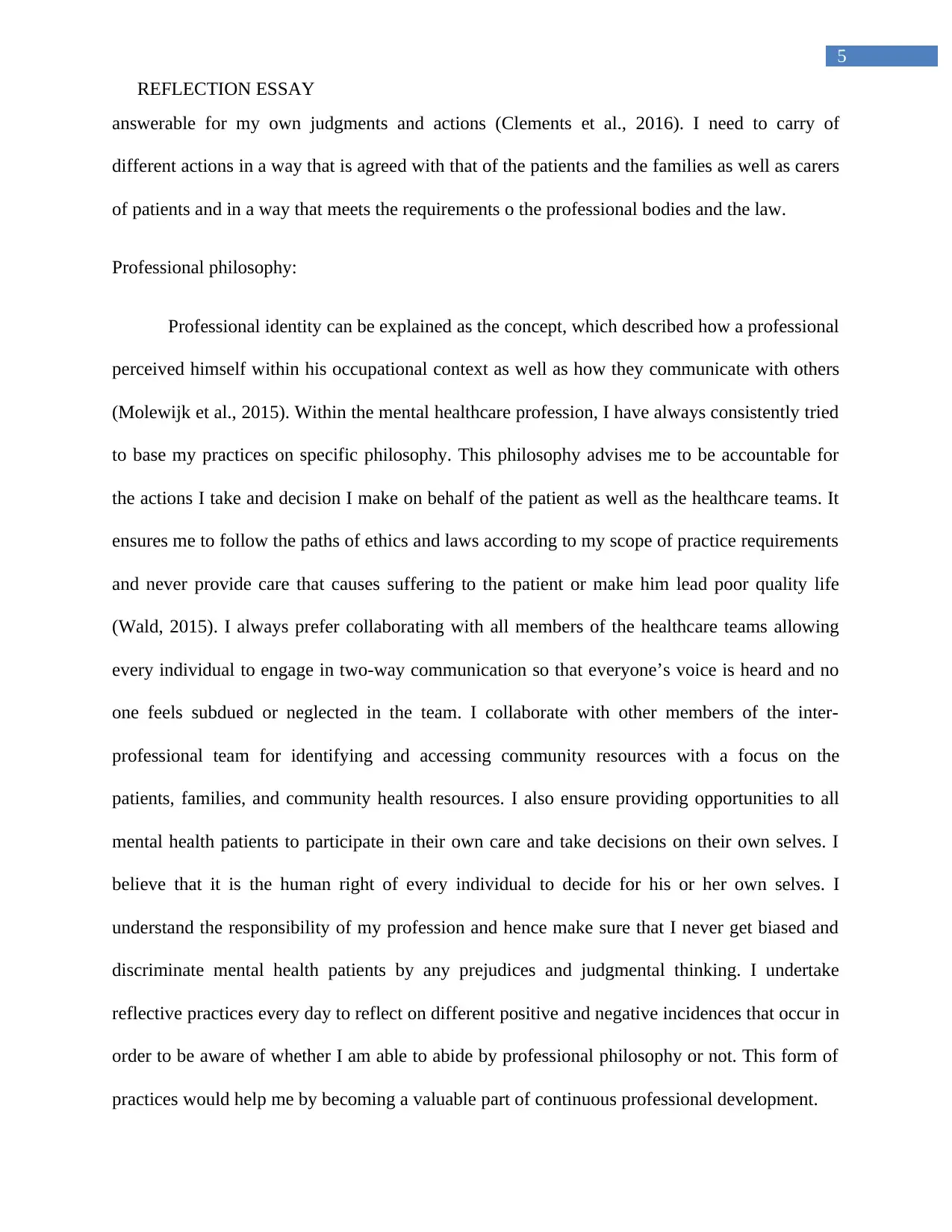
5
REFLECTION ESSAY
answerable for my own judgments and actions (Clements et al., 2016). I need to carry of
different actions in a way that is agreed with that of the patients and the families as well as carers
of patients and in a way that meets the requirements o the professional bodies and the law.
Professional philosophy:
Professional identity can be explained as the concept, which described how a professional
perceived himself within his occupational context as well as how they communicate with others
(Molewijk et al., 2015). Within the mental healthcare profession, I have always consistently tried
to base my practices on specific philosophy. This philosophy advises me to be accountable for
the actions I take and decision I make on behalf of the patient as well as the healthcare teams. It
ensures me to follow the paths of ethics and laws according to my scope of practice requirements
and never provide care that causes suffering to the patient or make him lead poor quality life
(Wald, 2015). I always prefer collaborating with all members of the healthcare teams allowing
every individual to engage in two-way communication so that everyone’s voice is heard and no
one feels subdued or neglected in the team. I collaborate with other members of the inter-
professional team for identifying and accessing community resources with a focus on the
patients, families, and community health resources. I also ensure providing opportunities to all
mental health patients to participate in their own care and take decisions on their own selves. I
believe that it is the human right of every individual to decide for his or her own selves. I
understand the responsibility of my profession and hence make sure that I never get biased and
discriminate mental health patients by any prejudices and judgmental thinking. I undertake
reflective practices every day to reflect on different positive and negative incidences that occur in
order to be aware of whether I am able to abide by professional philosophy or not. This form of
practices would help me by becoming a valuable part of continuous professional development.
REFLECTION ESSAY
answerable for my own judgments and actions (Clements et al., 2016). I need to carry of
different actions in a way that is agreed with that of the patients and the families as well as carers
of patients and in a way that meets the requirements o the professional bodies and the law.
Professional philosophy:
Professional identity can be explained as the concept, which described how a professional
perceived himself within his occupational context as well as how they communicate with others
(Molewijk et al., 2015). Within the mental healthcare profession, I have always consistently tried
to base my practices on specific philosophy. This philosophy advises me to be accountable for
the actions I take and decision I make on behalf of the patient as well as the healthcare teams. It
ensures me to follow the paths of ethics and laws according to my scope of practice requirements
and never provide care that causes suffering to the patient or make him lead poor quality life
(Wald, 2015). I always prefer collaborating with all members of the healthcare teams allowing
every individual to engage in two-way communication so that everyone’s voice is heard and no
one feels subdued or neglected in the team. I collaborate with other members of the inter-
professional team for identifying and accessing community resources with a focus on the
patients, families, and community health resources. I also ensure providing opportunities to all
mental health patients to participate in their own care and take decisions on their own selves. I
believe that it is the human right of every individual to decide for his or her own selves. I
understand the responsibility of my profession and hence make sure that I never get biased and
discriminate mental health patients by any prejudices and judgmental thinking. I undertake
reflective practices every day to reflect on different positive and negative incidences that occur in
order to be aware of whether I am able to abide by professional philosophy or not. This form of
practices would help me by becoming a valuable part of continuous professional development.
⊘ This is a preview!⊘
Do you want full access?
Subscribe today to unlock all pages.

Trusted by 1+ million students worldwide
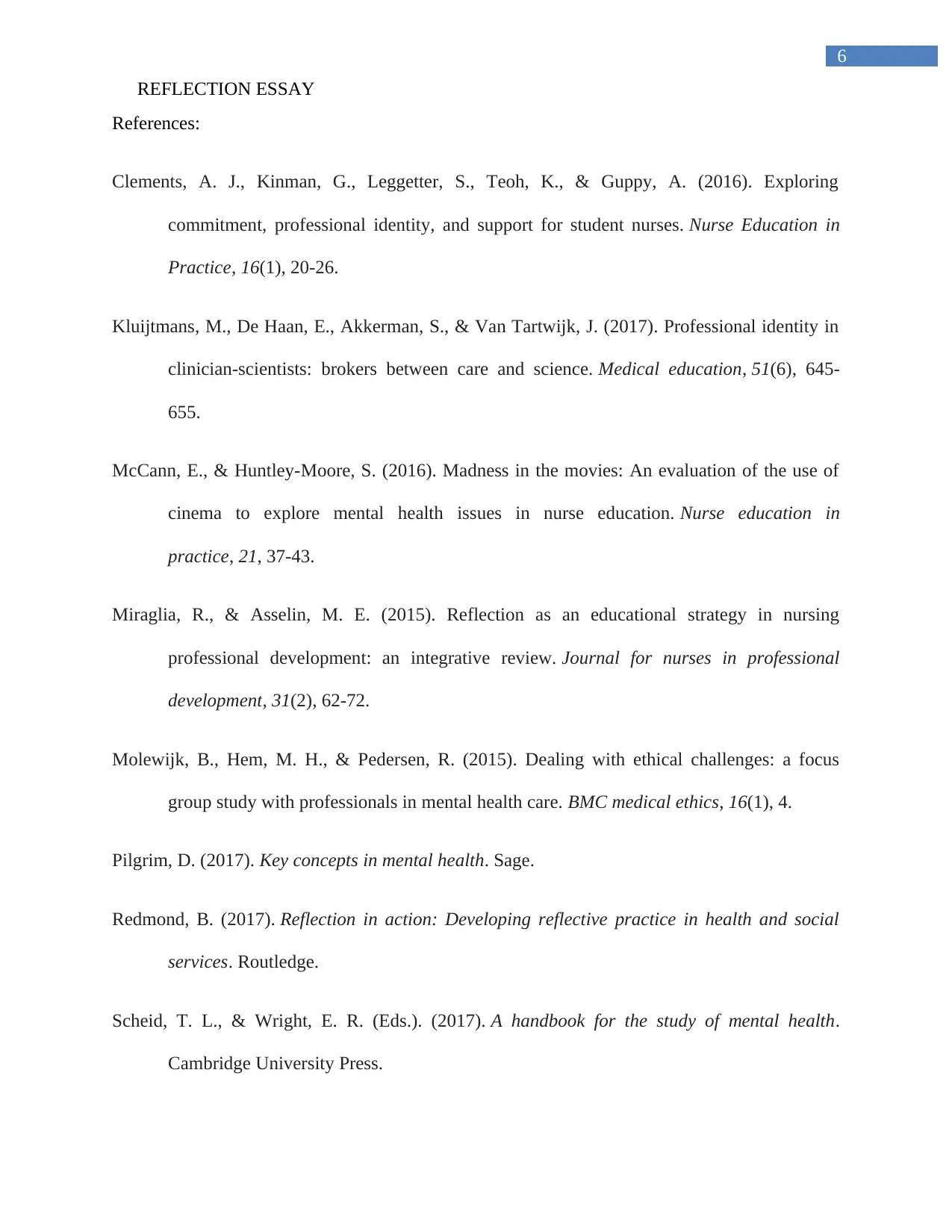
6
REFLECTION ESSAY
References:
Clements, A. J., Kinman, G., Leggetter, S., Teoh, K., & Guppy, A. (2016). Exploring
commitment, professional identity, and support for student nurses. Nurse Education in
Practice, 16(1), 20-26.
Kluijtmans, M., De Haan, E., Akkerman, S., & Van Tartwijk, J. (2017). Professional identity in
clinician‐scientists: brokers between care and science. Medical education, 51(6), 645-
655.
McCann, E., & Huntley-Moore, S. (2016). Madness in the movies: An evaluation of the use of
cinema to explore mental health issues in nurse education. Nurse education in
practice, 21, 37-43.
Miraglia, R., & Asselin, M. E. (2015). Reflection as an educational strategy in nursing
professional development: an integrative review. Journal for nurses in professional
development, 31(2), 62-72.
Molewijk, B., Hem, M. H., & Pedersen, R. (2015). Dealing with ethical challenges: a focus
group study with professionals in mental health care. BMC medical ethics, 16(1), 4.
Pilgrim, D. (2017). Key concepts in mental health. Sage.
Redmond, B. (2017). Reflection in action: Developing reflective practice in health and social
services. Routledge.
Scheid, T. L., & Wright, E. R. (Eds.). (2017). A handbook for the study of mental health.
Cambridge University Press.
REFLECTION ESSAY
References:
Clements, A. J., Kinman, G., Leggetter, S., Teoh, K., & Guppy, A. (2016). Exploring
commitment, professional identity, and support for student nurses. Nurse Education in
Practice, 16(1), 20-26.
Kluijtmans, M., De Haan, E., Akkerman, S., & Van Tartwijk, J. (2017). Professional identity in
clinician‐scientists: brokers between care and science. Medical education, 51(6), 645-
655.
McCann, E., & Huntley-Moore, S. (2016). Madness in the movies: An evaluation of the use of
cinema to explore mental health issues in nurse education. Nurse education in
practice, 21, 37-43.
Miraglia, R., & Asselin, M. E. (2015). Reflection as an educational strategy in nursing
professional development: an integrative review. Journal for nurses in professional
development, 31(2), 62-72.
Molewijk, B., Hem, M. H., & Pedersen, R. (2015). Dealing with ethical challenges: a focus
group study with professionals in mental health care. BMC medical ethics, 16(1), 4.
Pilgrim, D. (2017). Key concepts in mental health. Sage.
Redmond, B. (2017). Reflection in action: Developing reflective practice in health and social
services. Routledge.
Scheid, T. L., & Wright, E. R. (Eds.). (2017). A handbook for the study of mental health.
Cambridge University Press.
Paraphrase This Document
Need a fresh take? Get an instant paraphrase of this document with our AI Paraphraser
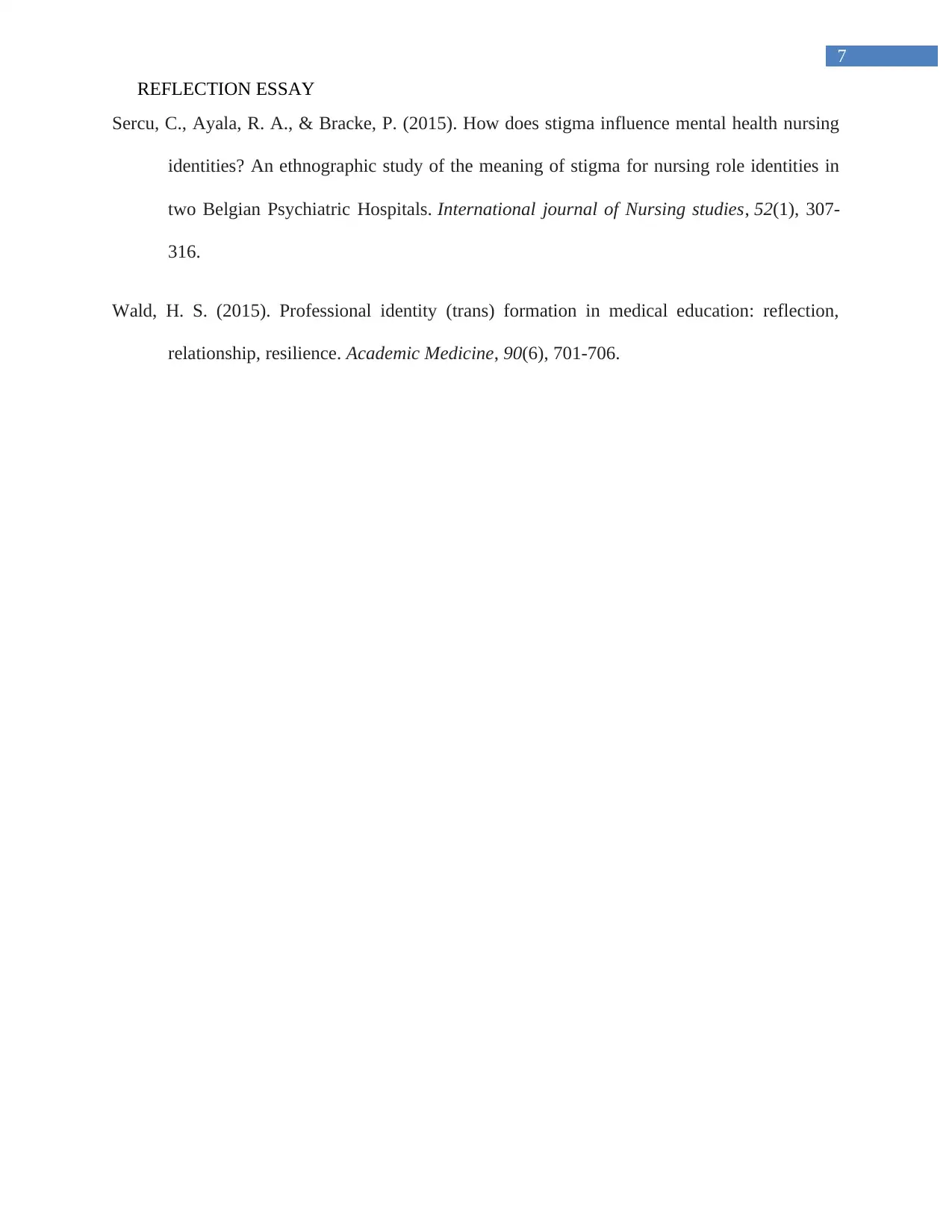
7
REFLECTION ESSAY
Sercu, C., Ayala, R. A., & Bracke, P. (2015). How does stigma influence mental health nursing
identities? An ethnographic study of the meaning of stigma for nursing role identities in
two Belgian Psychiatric Hospitals. International journal of Nursing studies, 52(1), 307-
316.
Wald, H. S. (2015). Professional identity (trans) formation in medical education: reflection,
relationship, resilience. Academic Medicine, 90(6), 701-706.
REFLECTION ESSAY
Sercu, C., Ayala, R. A., & Bracke, P. (2015). How does stigma influence mental health nursing
identities? An ethnographic study of the meaning of stigma for nursing role identities in
two Belgian Psychiatric Hospitals. International journal of Nursing studies, 52(1), 307-
316.
Wald, H. S. (2015). Professional identity (trans) formation in medical education: reflection,
relationship, resilience. Academic Medicine, 90(6), 701-706.
1 out of 8
Related Documents
Your All-in-One AI-Powered Toolkit for Academic Success.
+13062052269
info@desklib.com
Available 24*7 on WhatsApp / Email
![[object Object]](/_next/static/media/star-bottom.7253800d.svg)
Unlock your academic potential
Copyright © 2020–2026 A2Z Services. All Rights Reserved. Developed and managed by ZUCOL.





